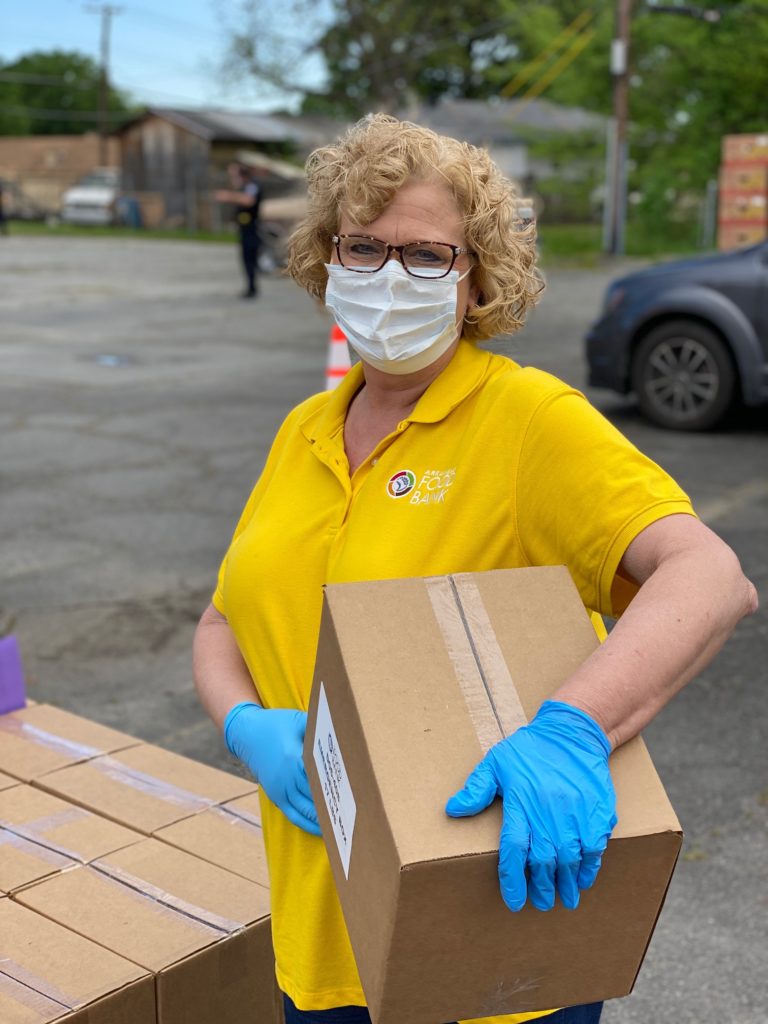We are now 2 months into Arkansas’ response to COVID-19 so I wanted to take this opportunity to give you a perspective on what the Arkansas Foodbank is seeing during these unprecedented times. Not only has our distribution model been different due to COVID-19, but the people seeking assistance have been very different than those we have seen prior to COVID-19. While this pandemic immediately affected those in the hospitality and retail industry, those effects have radiated out into some unexpected areas such as healthcare, gas and oil, and consultant services. With empty waiting rooms, restaurants and event venues, lower gas prices and lower uses, and postponement of major campaigns and internal initiatives, many have found themselves without enough revenues to maintain the expenses they have. Each organization is handling their situation differently, but ultimately it results in pay cuts, fewer hours, lengthy furloughs, or even closure. This means that people, who on Friday had the means to pay for their monthly mortgage or vehicle loan, find themselves on Monday without a steady income. Often the family or friend unit they would have turned to for assistance is also dealing with the same issues which leave people looking for ways to fill the gap in their household needs. This is where the Arkansas Foodbank and other food banks like us come in.
We are the emergency food system in our communities. We provide access to a limited amount of food to fill the gap while a family or individual works through their crisis situation and seeks a new normal. Because of this, we typically work through local pantries and soup kitchens to provide food to help them for three or four days. With the COVID-19 situation, we have seen such dramatic increases in unemployment that we have also added mobile food distributions and pop-up pantries to our list of avenues to serve those in need. Whether at an agency or a mobile food distribution, we seek to provide enough food for about 3 days to fill that gap for them. As we visit with individuals we are always surprised to find out their situation that has created that need. They range from a sudden lay-off to a major illness, to even a death in the family. They are asking for just a little bit of help until they can get back on their feet. During the COVID-19 shutdown, this is even more prevalent. Approximately 40% of those coming to pantries and mobile food distributions have never needed help before. They are often middle-class workers with what seems to be the best of everything but they are stuck in a crisis. They are waiting on unemployment, they are waiting on their job to possibly be reinstated, they are waiting and planning on major lifestyle changes that will be occurring, but during that time of waiting and changing they still need just a few days of food to help their families. This is real life and it is how we all respond to a crisis in our lives.
I feel it is important for us, as the emergency food system, to keep a non- judgmental perspective on the needs on around us. At this time, I see individuals and families who are critically poor and have extreme needs on a daily basis, I also see those who have just entered into a state of need with very limited resources. While the level of their crisis may vary, they all have one thing in common, their humanity. They are all scared for the future of their families and loved ones and they are embarrassed by the need to ask for help. Because of this, we don’t require those reaching out to us to explain their situation, nor do we attempt to rate their stories in order to determine whether they deserve assistance or not. We serve anyone who has faced their reality to the point that they are lining up for help. We support them in as many diverse settings as possible. Remember, many of the families reaching out for help have not ever used a pantry, so drive up food distributions in familiar locations makes it easier for them to have access. We also have increased our ability to help people find a pantry location and the hours they are open. We are using new text applications as well as information pieces on our social media pages.
All-in-all, the need we are seeing now pales in comparison to the great recession 10 years ago. It has rolled over any economic barriers and it has swept across all industries. We are putting in many extra hours to reach those in need by adapting our systems while stewarding resources from our gracious donors. As a person dedicated to helping those in need, I can sleep at night knowing I have provided multiple and safe opportunities for those in need and have worked to eliminate judgment for those who are reaching out. The real truth is that none of us truly get what we deserve and that grace infinitely abounds when we need it most.

About Arkansas FoodbankArkansas Foodbank, the largest hunger-relief organization in Arkansas serves 33 counties in central and southern Arkansas. The Foodbank is a member of Feeding America and the Arkansas Hunger Relief Alliance. The Foodbank offers innovative programming focused on serving hungry Arkansans with more healthy and nutritious food. Programs like Food For Kids, Food For Families, and Food For Seniors provide food and other resources for more than 420 food pantries, soup kitchens, schools, colleges, shelters, senior centers, and other agencies that provide aid directly to hungry Arkansans. For information on how you can fight hunger, visit www.arkansasfoodbank.org






